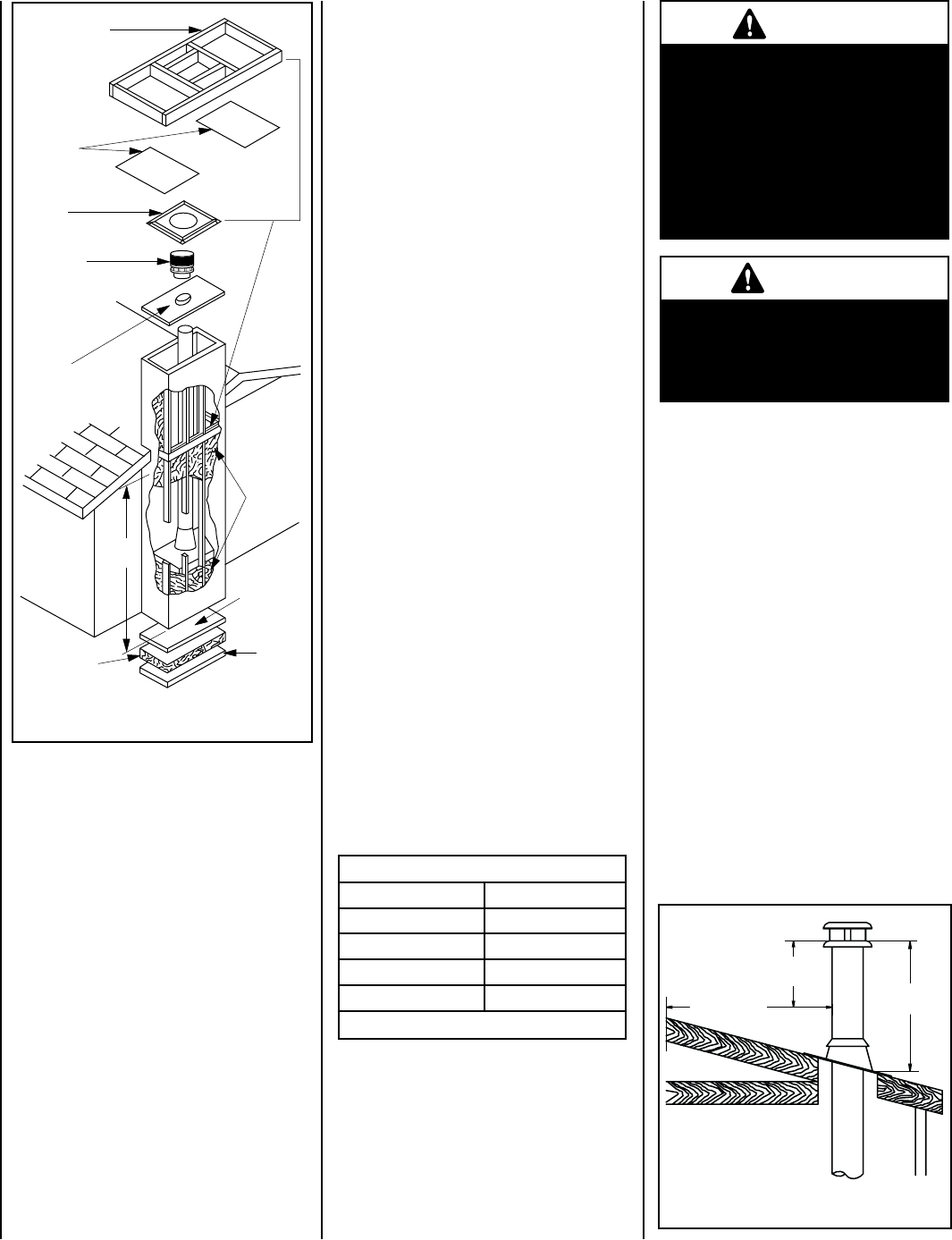
NOTE: DIAGRAMS & ILLUSTRATIONS ARE NOT TO SCALE.
12
WARNING
If insulation is used, the fireplace
must not be placed directly
against it. Insulation or vapor
barriers, if used, must first be
covered with drywall panels,
plywood, particle board or other
material to assure insulation and
vapor barriers remain in place.
WARNING
Do not pack or fill required air
spaces with insulation or other
material. No material is allowed
in these areas.
AC chimney should not be used in cold areas,
where temperatures are likely to fall below 32°
F (0° C), or altitudes above 4000 feet.
A chimney venting a fireplace shall not vent any
other appliance.
The minimum system heights are indicated
in Table 1.
In altitude, add 18" (450mm) to the chimney for
every 2000 feet (600 m) above sea level.
All chimney installations must include at least
one support. The maximum length of chimney
that can be supported by the fireplace is 12 feet
(3.6 m) for S-2100+, 18 feet (5.4 m) for ASHT+
and 26 feet (8 m) for AC chimney.
The chimney must extend at least 3 feet
(915mm) above its point of contact with the
roof and at least 2 feet (610mm) higher than
any wall, roof or building within 10 feet (3 m)
of it (see Figure 15).
If the chimney extends higher than 5 feet
(1500mm) above its point of contact with the
roof, it must be secured using a roof brace
or guide wires.
A rain cap must be installed on top of the chim-
ney. Failure to install a rain cap may cause the
fireplace to corrode and operate inefficiently.
Cut and frame square holes in all floors and
the roof to provide a 2" (50mm) clearance
between the chimney and any combustible
materials. Do not fill this 2" (50mm) space
with any material.
Portions of the chimney which may extend
through accessible spaces must be enclosed
to avoid contact with combustible materials or
damage the chimney.
Figure 14
Insulate Joists
Same As Ceiling
Draft Stops
Firestop
CTDT
Termination
Note: Non-
Combustible
Chase
Flashing
Must Be
Used To
Cover
Chase
Opening
Optional
Insulation
In Outside
Walls Of
Chase
Solid
Continuous
Surface
Outside
Base
Insulation
(Thermal Barrier)
8'
Level
CHIMNEY SYSTEM
The ME43 fireplace is listed only with Security
Chimneys™ International Ltd. chimney sys-
tems, models ASHT+ 8", S-2100+ 8", or AC
8". Do not connect the fireplace to a masonry
chimney, chimney liner, or other brand of
factory-built chimney.
In areas with continuous temperatures below
0º F (-18º C), the use of an exterior chimney
increases the likelihood of operating problems
such as low draft, high rate of creosoting and
poor start up characteristics. Exterior chim-
neys are also prone to down-drafting and flow
reversal. Installations located in a basement,
in combination with outside chimneys, are
especially prone to flow reversal. In cold areas,
air cooled chimneys should not be used in an
exterior installation.
*Construction Materials:
• framing materials • paneling
• particle board • flooring
• dry wall • etc.
• plywood
Note: 2" clearance to combustibles around
chimney components required.
Note: Do not insulate the chase cavity with
blown or fill type insulation materials.
Note: Local codes may not require firestopping
at the ceiling levels for outside chase installa-
tions. However, it is recommended for safety
and the reduction of heat loss.
Chimney Height
The total height of your completed fireplace
system from the surface the fireplace rests on to
the chimney top must not exceed 60' and must
also meet minimum height requirements. Refer
to the minimum system height chart.
Figure 15
2' min.
(610mm)
10' (3000mm)
3' min.
(915mm)
Minimum System Heights
Fireplace Model ME43BK SP
Chimney Model ASHT+ / S-2100+ / AC
Vertical Installation 15 feet (4.57 m)
One Offset (2 elbows) 18 feet (5.49 m)
Two Offsets (4 elbows) 20 feet (6.10 m)
Table 1
